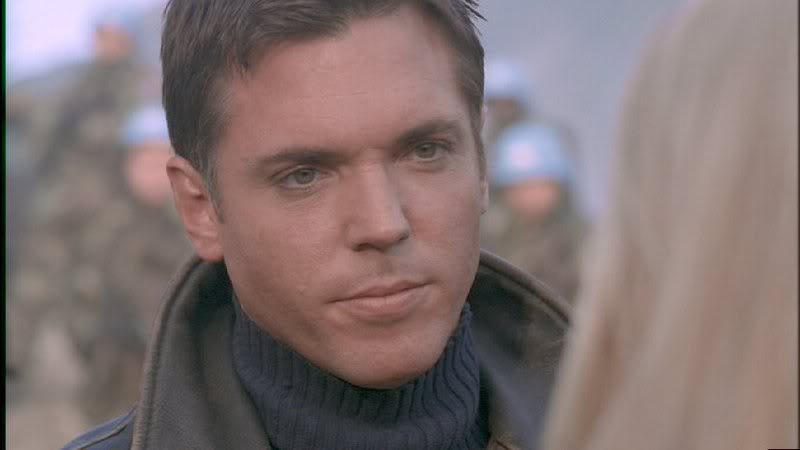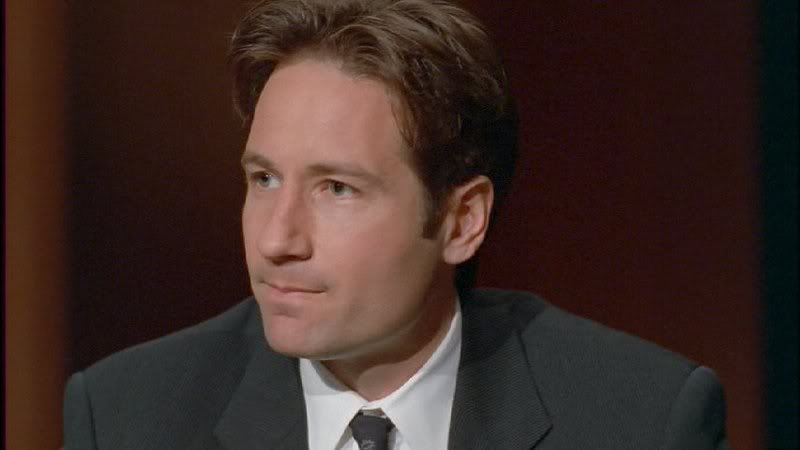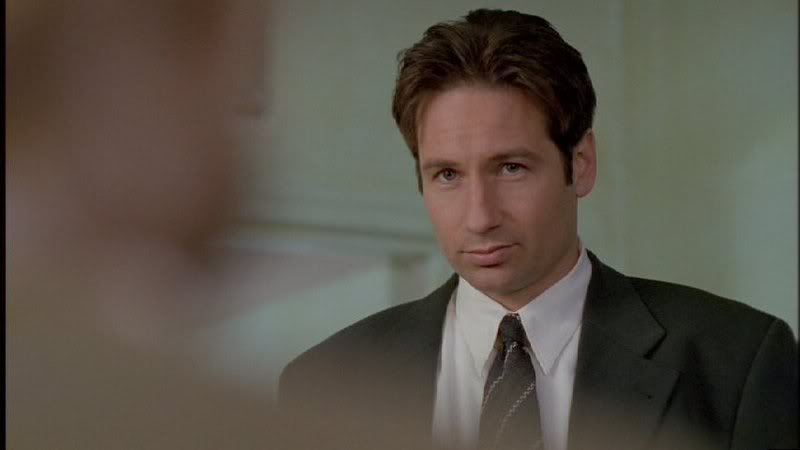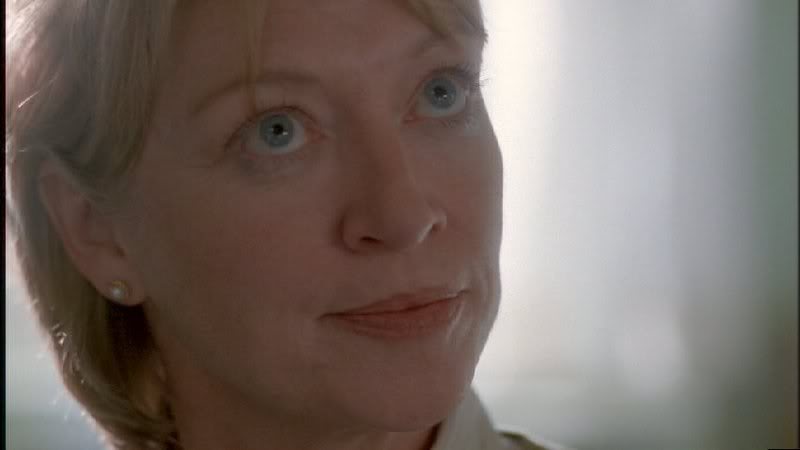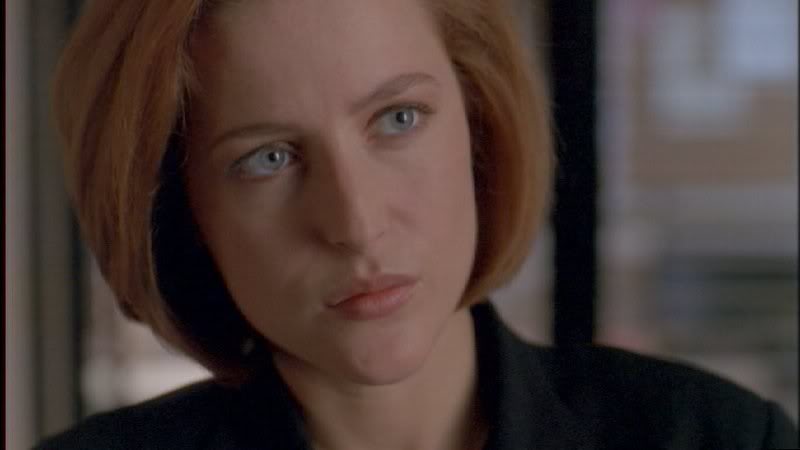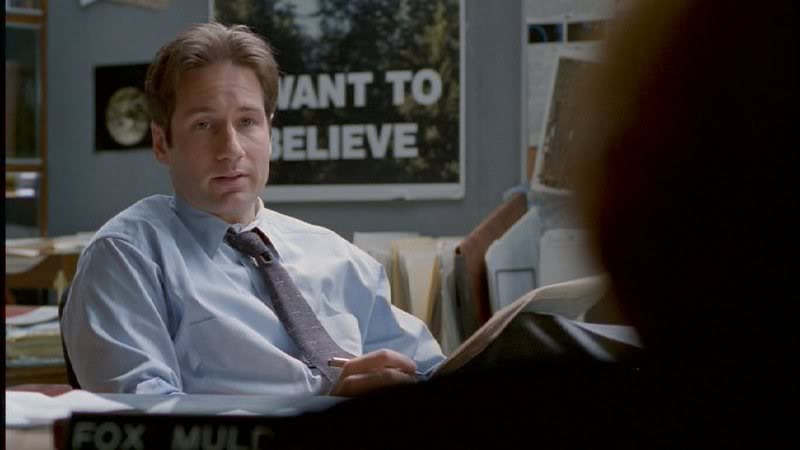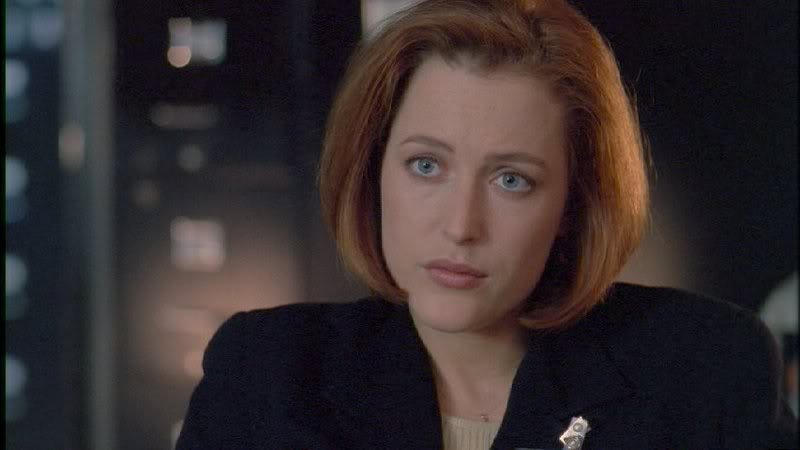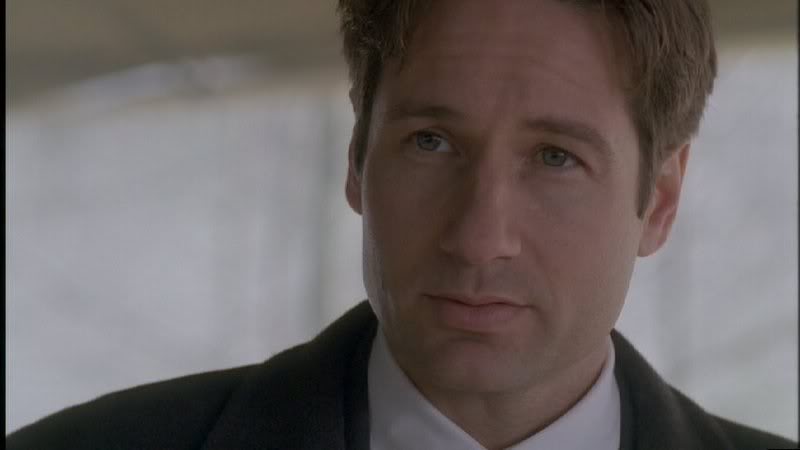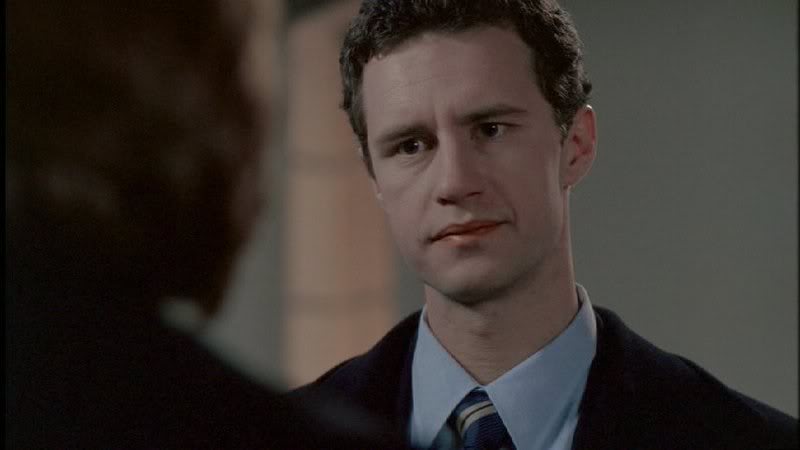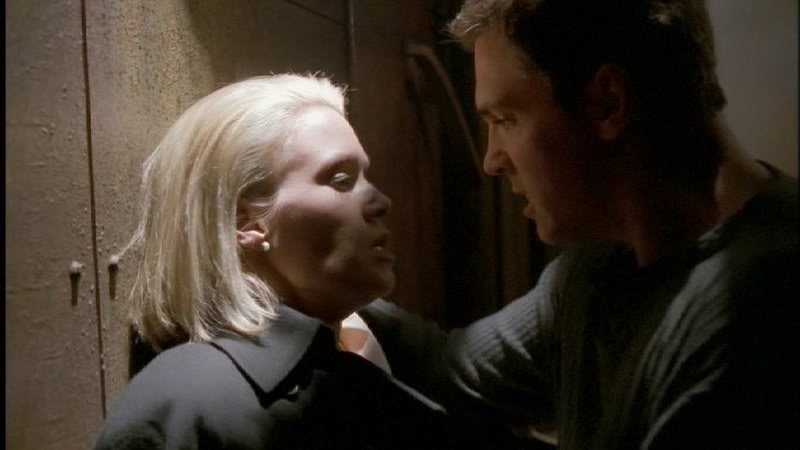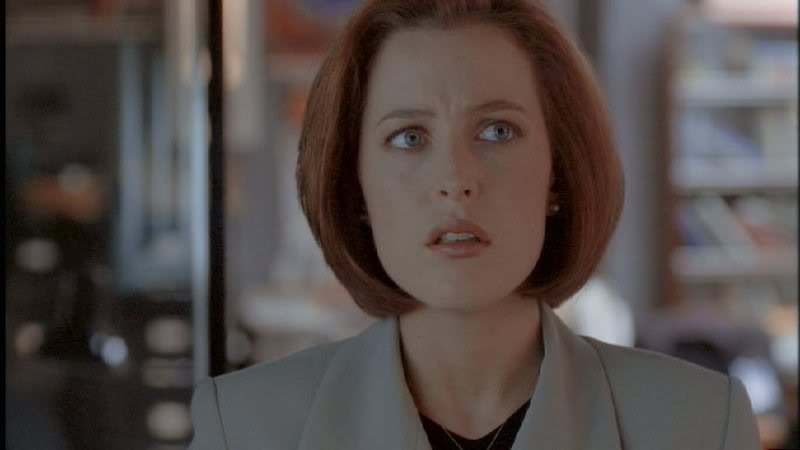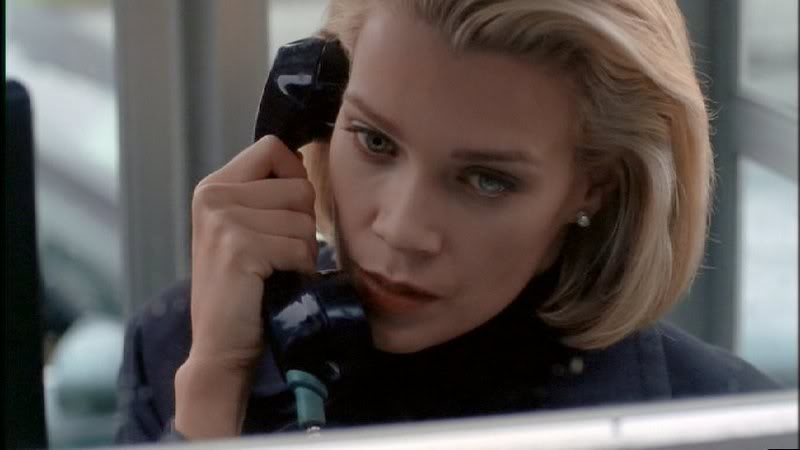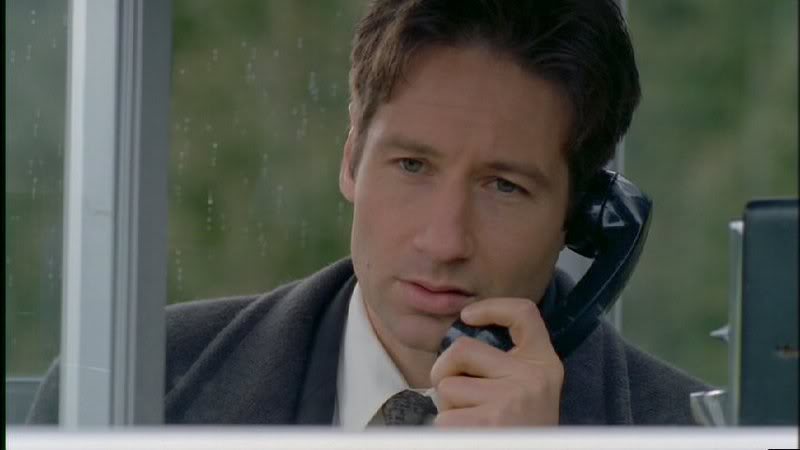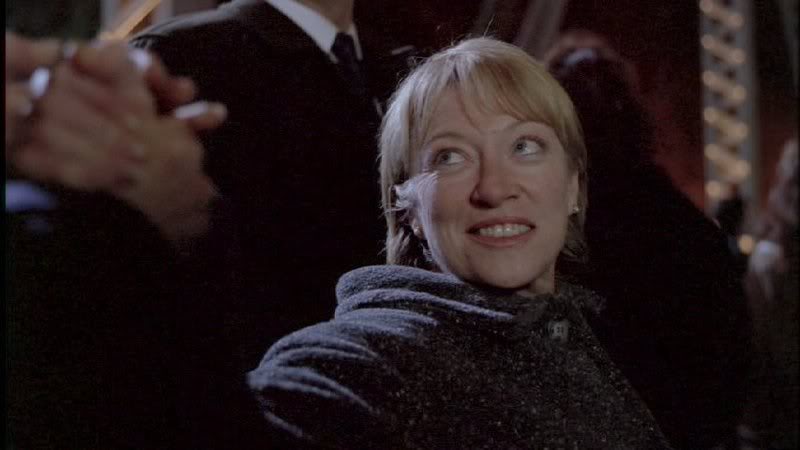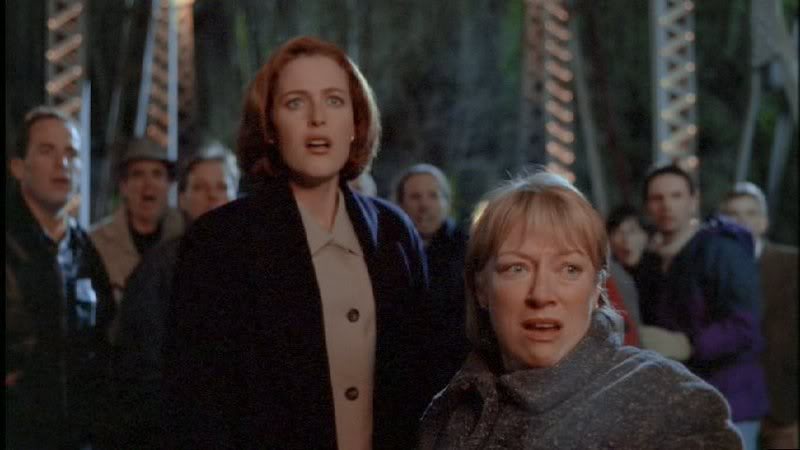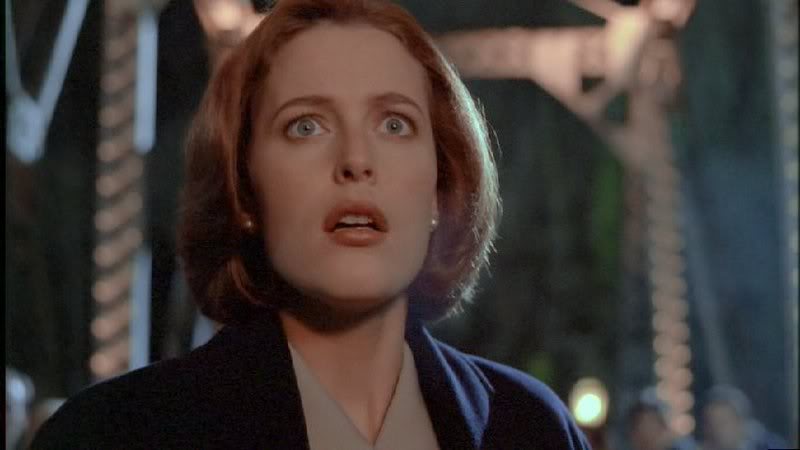REPOST -- CTP Episode of the Day - 04.06.06 - Patient X
Today's Cherished Episode: Patient X (5x13)
Original Air Date: March 1, 1998
Written By: Chris Carter & Frank Spotnitz
Directed By: Kim MannersAs a disillusioned Mulder denies all evidence of extraterrestrial visitors, Scully -- along with thousands of other abductees -- is drawn toward a final confrontation.
One more anal-probing, gyro-pyro levitating-ecoplasm alien anti-matter story, and I'm gonna take out my gun and shoot somebody.
Well, I guess I'm done here. You seem to have invalidated your own work. Have a nice life.
Some "Patient X" Tidbits & Musings:
-- Title: "Patient X" is a term used to describe a patient in a recognized or published case who will remain anonymous; in this case, that patient was Cassandra Spender.
-- "'Patient X' was an amazing turning point for me in my career on The X-Files because I think it might have been one of the most important mythology shows that I directed," recalled director Kim Manners. "And it was a turning point in the series. It introduced a new aspect of the mythology -- the faceless aliens, those who disfigured themselves so they couldn't be infected by the black oil. And all season we had been playing with the role reversal -- Mulder becoming the skeptic and Scully becoming the believer -- and that was a really big step for this series, to totally flip the dynamic. In the first half of this two-parter, we saw Mulder more determined than ever not to believe, and we saw Scully beginning to accept that she may actually have been abducted by aliens. This was quite a challenge for David, for Gillian, and for me. We all had to find the correct way to play this change in their beliefs to make it interesting, compelling, and believable."
-- "Vancouver had a great Russian acting community," said Manners, "and we used them quite a bit in the episodes we shot up there, including 'Patient X' and 'Tunguska/Terma.' Many of them were well known stage actors before they left the U.S.S.R. and wound up in Vancouver. The two boys in the teaser were Russian."
-- Alex Shostak, Jr., who played Dimitri, was a 17-year-old high school student whose family emigrated to Canada from the Ukraine in 1996. Shostak translated his own lines from English into Russian, and thought that Nic Lea's Russian pronunciation and accent was "not bad." His father, Dieksly Shostak, had a small role in Season 4's "Terma."
-- This was the first episode where Nicholas Lea was credited under the "Also Starring" heading.
-- "Nic [Lea] and Laurie [Holden] were very nervous about speaking Russian in the episode," recalled Manners. "They both worked very hard to deliver the lines realistically -- and Russian is a very hard language."
-- "I spent hours and hours working on the Russian lines," said Laurie Holden. "It was a lot of work for me and more for Nick, for about 30 seconds on screen."
-- "Shooting the panel scene at the beginning of the episode was very challenging," Manners said. "The actors on the panel and the audience members all stay in one place during the scene, there's no action to cut away to, so I had to make sure to get enough camera angles and enough footage for the editors to work with to keep the scene interesting for the viewers."
-- Mulder's final words at the end of his rant at the lecturer's forum -- "... a conspiracy wrapped in a plot inside a government agenda" is very similar to a 1939 quote from Winston Churchill in which he described Moscow as "a riddle wrapped in a mystery inside an enigma."
-- The scenes at the gulag were filmed on a set designed by art director Graeme Murray and built at North Shore Studios. "Graeme did such fantastic work," said Manners, "and all the sets for 'Patient X' were just incredible. Chris [Carter] really instilled in everyone the mindset that we were making a feature film every week and it was so much fun to work in that kind of atmosphere."
-- Cassandra Spender was named for a figure in Greek mythology, the prophet Cassandra. Apollo fell in love with her and granted her the gift of prophecy; however, since she did not love him back he cursed the gift by having no one believe her prophecies. (In this episode, Mulder calls Jeffrey the "son of the prophet").
-- When executive producer Carter asked her to appear on The X-Files, he told Veronica Cartwright that he had been trying to find a role for her on the show for years. "What's ironic is that I had started watching The X-Files in the beginning, but when they started getting into all those weird CHUD people and all of that stuff, I lost interest," Cartwright said. "I liked it more from the political end -- is it the government that's doing this, was she abducted or not?"
-- The producers sent Cartwright a tape of "Duane Barry," the episode that introduced the character through whom Cassandra Spender became aware of the existence of Fox Mulder (as she told Mulder in the episode). "I came home and I watched it," said Cartwright, "and I called them the next morning and said, 'Send me part two!' And I got so addicted, I watched the show ever since."
-- The role appealed to the actress because it was different from anyone she had played before -- particularly the histrionic Lambert from Alien and Felicia Alden in The Witches of Eastwick. "In Alien I was supposed to be the reflection of the audience," Cartwright said. "In Invasion of the Body Snatchers my character was putting all the pieces together, but then it became a matter of survival. In Candyman 2 I was a woman dying from cancer, and it was my daughter that was being chased by the Candyman, so I wasn't a real screamer in that one -- I was an alcoholic. What I liked about Cassandra Spender was that she so completely believed that she had been abducted several times, and that the things that had happened to her were so that the aliens' universe could become closer to our universe -- she was very calm about the whole thing. These were just statements of fact. I liked the fact that she wasn't standing on some bandwagon; this is what she truly believed."
-- Kim Manners was particularly thrilled to be working with Veronica Cartwright. "That was really a treat," he said. "I had known her since I was a child actor myself and then I had the privilege to direct her, and she did such a magnificent job." Manners said Cartwright remembered working with him on a project when they were children, but neither could remember the name of the project.
-- "When we were filming the scene where Cassandra meets Mulder for the first time," said Manners, "I was setting up the close-up shots and Veronica said to me, 'You're not really going to get that tight on me, are you?' And I said, 'Welcome to the X-Files.'"
-- "The makeup on Alex Shostak [Dimitri] after he was infected with the black oil was amazing and realistic," Manners said. "His ears were plugged. He could not open his eyes or his mouth -- we had to get a tiny straw for him to sip water through. I literally had to turn his head so he would be looking in the right place for the camera. He was really a trooper. We shot all day in a warehouse in Vancouver that was filling in for the bowels of a ship. I remember that when he was done for the day, he went to have his makeup taken off, which took two hours, and then he came back to the set. I said 'what are you doing here?' and he said he came back because he wanted to see where he had been all day."
-- "I wanted Marita to look just as powerful as all those men in the syndicate office," said Manners of filming the scene where Marita reported to the Consortium members in New York. "I think that was the first time we had seen a woman in that office, and I wanted her to look like she belonged there, that she wasn't intimidated by them."
-- In "Patient X," Skyland Mountain was identified as a National Park; but in "Ascension," it appeared to be more of a private ski resort.
-- "We got that in Take Number 1," Manners said of the scene where a long line of cars passed the Skyland Mountain sign. "If we had had to back those cars up and start all over, we would have been there forever."
-- The scenes on Skyland Mountain were filmed at the Greater Vancouver Regional District (known as the Seymour Demonstration Forest in 1998). "It was like Vancouver's version of the Hollywood backlot," recalled Manners. "We filmed many X-Files episodes there, and just about any show I worked on in Vancouver filmed there at one time or another."
-- The constellation that figured prominently in this episode was Cassiopeia. Aside from the constellation being in the particular area of space where aliens are speculated to originate, Cassiopeia is named for Queen Cassiopeia, who in Greek mythology was the wife of Cepheus and the mother of Andromeda. Because Cassiopeia thought herself more beautiful than the daughters of Nereus, a god of the sea, she challenged the anger of the god Poseidon. To punish Cassiopeia for her boastfulness, she was chained to her throne in the heavens for all eternity (much like Cassandra is chained to her wheelchair).
-- "Realizing she had a connection with Cassandra, that the chip in her neck might have been placed there by aliens, was a big turn for Scully," Kim Manners said. "And Gillian played it beautifully."
-- The man set on fire on Skyland Mountain was the show's stunt coordinator Tony Morelli. "We had to light him up a half a dozen times," said Manners, "because the burn was shot from different angles. Usually you would only shoot a burn from one direction with numerous cameras, but I had to do a reverse shot to get the driver's reaction to the man on fire outside his car."
-- It was mostly X-Files staffers who apparently met their demise at Skyland Mountain. The list of victims that scrolled by on Cassandra Spender's television set were mostly the names of the series' crew members. Some of the most notable were Chris Flemington (on-set special effects), Peter Huff (transportation coordinator), Marty Grohn (transportation captain), Nigel Habgood (picture car coordinator), Don McGill (on-set prop master), James Pate and Kathleen Kasinger (assistant prop masters), and Val Arntzen (set decorator). (Arntzen was also the name Krycek used in "Tunguska/Terma." Other crew members names shown on Cassandra's TV were Dave Brownlee, Mitch LaFleur, Wayne Power, Bob Buxton, Marty Lacroix, William Unrau, Andrew Sculthrop, Malcolm Johnson, Bruce McLeod, and Karl Ojamae.
-- The shot of Krycek's ship in New York Harbor was created using numerous visual effects elements, including a stock shot of the New York City skyline, a shot of a ship in Vancouver harbor that was used in "Dod Kalm," fog elements that were created for the episode "The Walk," and smoke created by a remote control smoke car -- a lot of work for a shot that was on screen for only a few seconds.
-- "The X-Files was always a very smoky set," recalled Kim Manners. "The sets were always smoked up in order to get the light to filter through the way it did." Manners noted that even a well-lit scene like the one in "Patient X" of Mulder and Scully in the X-Files office used the effect in order to have the light filter through the office windows in just the right way.
-- The scenes at the phone booth in "Patient X" were filmed near Burnaby, outside of Vancouver, on the grounds of Riverview Hospital, an old psychiatric hospital where many early X-Files episodes were filmed. "It had a very institutional look to it," said Kim Manners, "so we used it a lot for episodes where we needed government or university buildings. The phone booth we used was one on the outskirts of the grounds there."
-- Ruskin Dam, Pennsylvania, was played by Ruskin Dam, a 70-year-old hydroelectric facility located approximately 50 miles east of Vancouver. The dam had a magnificent spillway, a visually striking connecting bridge and powerhouse, safe landing zones for helicopters, and numerous camera positions in the surrounding hills. But the location needed a lot of work to be suitable for exterior filming. To make the connecting bridge suitable for carrying emergency vehicles, camera crews, equipment, and huddled masses of doomed alien abductees, the X-Files construction department laid down a complete temporary roadbed, painted much of the existing structure, and installed seven replacement lamp standards, duplicates of the three remaining originals, designed and built by Graeme Murray's art department.
-- "It was a huge job," recalled X-Files location manager Todd Pittson. "The pre-light on that bridge sequence took about a week to get it all lit, so you could actually see some background, because we were out there basically in the middle of nowhere."
-- "Working on that bridge was so much fun," said Kim Manners. "And the people at the dam were great. They would turn the dam water on for me whenever I asked them to. We brought the helicopter in with this night light that they had to shine right into the lens -- very, very difficult. And then the CGI people would later turn it into a spaceship. But it was extremely cold, so cold that when Chris [Carter] directed part two ["The Red and the Black"] he built the bridge and the transmission house on a sound stage to film Cassandra's abduction scene."
-- About the time when "Patient X" was filming, there were lots of rumors floating around, and Chris Owens heard them all: That he was the chosen replacement for David Duchovny; that he was the threatened replacement for David Duchovny; that he would appear in eight episodes in Season 6 and Duchovny would appear in eight; that his casting was a sure sign the show would remain in Vancouver; that his casting was a diabolically misleading sign that the show would be leaving Vancouver. "People kept telling me to be prepared for big news," Owens said, "And I kept asking myself 'What is it?'."
-- As it turned out, Owens was neither a bargaining chip, an insurance policy, or a plot device. He was just an actor appearing in a TV series in a role written especially for him. "Believe it or not, I didn't have to audition for the part of Jeffrey Spender," said Owens incredulously, "which was a great privilege."
-- Early in his career, Owens was bartending and waiting tables between roles. Many of the roles had titles like "Soldier" and "Young Security Guard." When asked about this period of his life, Owens smiled proudly and said, "I've supported myself since I was eighteen."
-- Chris Owens was born and raised in Toronto; his father was a radio broadcaster; his mother a jazz singer; and his stepfather a musician-turned-magician-turned-optician. He studied acting at the University of Toronto and at the prestigious Herbert Berghof Studio in New York City. "I was there for two stints of three and four months apiece," he said. "It was a great learning experience."
-- Back in Toronto, he had his "career ups and downs," including small roles in the Tom Cruise film Cocktail; the cable TV movie Almost Golden: The Jessica Savitch Story; and several stretches filled primarily with food-service and other temporary jobs.
-- In mid-1996 he moved west to Vancouver in search of further opportunity, which found him in the form of "Musings of a Cigarette-Smoking Man." He guest-starred in that episode as the Young Cigarette-Smoking Man, messing with the minds of such reimagined notables as Lee Harvey Oswald and James Earl Ray, and giving such a cool, tightly controlled, and sometimes frightening performance that he got almost as much notice as "Musings," one of the most noticeable episodes of the fourth season.
-- Then came a real fright: After "Musings" wrapped, he applied for several waiter jobs and for the first time in his working life didn't get a single one. "Nobody knew me in the Vancouver restaurant world," said Owens, wryly. "But luckily after a little while The X-Files called me and said they needed me for a flashback." That flashback was as the Young Cigarette-Smoking Man in "Demons," a Season 4 standalone episode written by executive producer R.W. Goodwin. Shortly thereafter, he was also cast in an early second-season hour of Millennium.
-- Clearly, he was now part of Chris Carter's extended stock company. Early in the fifth season, Owens was called in to audition -- naked-faced -- for the nearly impossible role of the Great Mutato, the grotesquely featured centerpiece of "The Post-Modern Prometheus." He won the role and the right to guest star, completely unrecognizable, beneath several layers of elaborate and unwieldy prosthetic makeup. Acing this exhausting assignment earned him a prized back-handed compliment from Carter. "After 'Prometheus' we ran into each other at a local bar one evening," said Owens. "When Chris saw me he shook my hand and said, 'I didn't know they served guys with two faces here.'"
-- What Owens didn't know was that another admirer -- David Duchovny -- had taken careful notice of Owens and recommended to Carter that he be brought back on to the show as soon as possible. Thinking much along the same lines, Carter took advantage of Owens's Young Cigarette-Smoking Man heritage to create Jeffrey Spender; a foil to Fox Mulder and a character whose murky and Mulder-like alleged genetic connections to the Cigarette-Smoking Man could be exploited to the fullest.
-- That was when the rumors started. "I always knew David wasn't leaving," scoffed Owens. He did, however, admit that the announcement that The X-Files was moving to Los Angeles came "exactly one hour after I'd figured out it was definitely staying in Vancouver." After the big announcement, Owens was signed for approximately half of the episodes of the sixth season and Owens filled out the paperwork for his green card and sublet an apartment in Hollywood. "What a way to get to L.A.!" Owens recalled. "Never in my wildest dreams did I imagine anything like that would happen for me."
-- The part of the Swedish paranormal professor, Dr. Per Lagerqvist, was played by Max Wyman, the book review editor for the Vancouver Sun. He wrote about his experience in an article in the February 28, 1998, edition of the Vancouver Sun. This is a transcript of the article:
~ ~ ~ ~ ~ ~ ~ ~
To The X-Files Set, a Star is Borne
Sun Review of Books editor Max Wyman takes on a different guise on Sunday -- As a character in that evening's episode of The X-Files titled Patient X. Here's his story of how he found himself acting alongside David Duchovny, and what it was like.The truth is out there all right and, to be truthful, I think it was the out-there hair that clinched it. The X-Files people were looking for someone to play a visiting Scandinavian lecturer at a forum on extraterrestrials. I seemed to fit right in.
Our neighbor Laura, a TV and movie booker with a Vancouver talent agency, has been pushing me for months to try out for small parts on locally made Hollywood shows. I do, it's true, have a performance history. I was in a school production of Macbeth with David Frost in 1956. I directed the first English-language production outside London of Samuel Beckett's Endgame in 1958 (at the University of Nottingham). The Vancouver acting community is still recovering from my years as a theatre critic. And I've done radio and TV chitchat for years. But to all intents and purposes, my practical experience in the theatre is nil.
That didn't bother Laura. "You're a natural," she said. "They're always looking for new faces." Not to mention (she was polite enough not to) new hair.
I auditioned last year for an X-Files role as a Russian-speaking abduction victim (no luck, though I didn't mind -- when the show reached the screen the role had become voice-only). I tried for Millennium and for a movie of the week. Nothing.
Then came "Patient X" and the tiny part of Dr. Per Lagerqvist.
The way Laura tells it, the X-Files casting people asked her to send me as a possible for this one-scene role. But when I got there, a bunch of professional actors I recognized from my reviewing duties over the years were up for the same scene. I did it dead straight, no accent, and told myself to chalk up another one to experience.
But the next day, Laura phoned to say I'd received a callback. This time the competition was down to two of us, series creator Chris Carter was on hand for the reading, and by the time I got home Laura had phoned to say I had the job.
Well, big excitement. They called me in for a costume fitting the next morning (grey suit? black suit?) and my one-day shoot (as we movie people say) took place on location (as we movie people say) a month ago in Port Moody.
Talk about starting at the top - since the part involved more than three lines (it was actually 12, but they're really short lines), I was officially classified as a "principal actor" and given my own trailer (as we movie people call it), complete with my character's name on the door.
Well, it wasn't the whole trailer: it was divided into a number of separate rooms, each allocated to one of the speaking members of the forum panel (the others were Barbara Dyke, who had read with me at both auditions, and Ron Halder, whom I remembered reviewing back in the '70s when he became a Vancouver Playhouse leading man straight out of drama school).
Still, it was a lot more than I'd expected -- I thought I'd probably be shoved into some communal dressing room with the extras. As it was, I had my own day-bed on which to rest and contemplate my lines and character portrayal, my own wardrobe with my assigned clothes neatly hanging waiting for me, and my own little bathroom. So this, I told myself, is what stardom is like.
The set was the Port Moody council chambers, which also function as the Inlet Theatre, converted for the occasion into a lecture hall. Every seat was filled -- 160 miscellaneous extras: clearly, no expense is spared by these X-Files people.
From the look of the script, I thought we'd be through the whole thing in an hour or so -- it's a very brief scene in which the expert panelists have cold water poured on their enthusiasm by Special Agent Mulder.
So much for what I know.
My wardrobe/make-up call was at 11 a.m., and we didn't wrap (as we say in the movie business) until 8:30 p.m. That included a one-hour lunch break at 5 p.m. (we movie folk always call the first meal-break of the day lunch, even if it's taken at midnight).
Talk about pampering, talk about being put at ease -- I even had a stand-in, who sat at my place so the camera people could do their measurements while I stretched my legs between takes ("Did they bring you up here from L.A. for this?" one of the extras asked me during a break). Getting such a close-up look at the sheer professionalism of what was going on gave me, I have to say, a new respect for the quality of work that goes into creating an hour of network TV entertainment in 10 days.
This was a place where calm, efficient creativity was happening at speed. Performance was just another element in the mix, like script and lighting and camerawork, and no one expected anything but consistently polished delivery. That's the reason for the pampering; that's why they want you at optimum ease.
The director, Kim Manners, a relentless dynamo with a pictorial vision that wouldn't quit, shot the scene over and over again, from every conceivable angle -- over shoulders, from below, in long shot, in extreme close-up. Kicking it in the ass was the term he used.
"Okay, new deal," Manners would cry, and they'd promptly rearrange the furniture and reposition the cameras. I lost count of the number of full-scene takes we did, but I'd guess it was at least 40.
The experience changed the way I watch TV: the next weekend, watching a Manners episode of The X-Files, I spent most of the time counting the fast-cut camera angles that give the show its visual vitality.
For the show's star, David Duchovny, it was just another day on the set. On screen, he'll seem to be wearing a smart suit, but below the forum table, where the camera couldn't see, he was wearing his shirt-tails loose over blue jeans. He was relaxed, almost nonchalant (like his delivery), kibbitzing from time to time with Manners and the crew, and making small talk with the panelists around him.
Someone told Duchovny it was my first experience at movie acting, which indeed it was, and despite what the gossips might say about his reputed brattiness, he was graciousness itself.
Part of my little speech that opens the scene involves the term "ontological shock" and I joked to him that he and I were probably the only people in the place who knew what that meant (I only knew because I'd asked my nearest and dearest, who has done post-graduate philosophy, to explain it, but I thought Duchovny's university background would probably make him au fait with the lingo). He laughed and said that was probably true, and dismissed the term as a big-sounding phrase for a simple idea.
Later, as we sat in our canvas-backed chairs between takes (his chair had his name on it; mine simply said CAST, but you can't have everything, at least not the first time), we talked about philosophy and the inflated uses of language.
Duchovny mentioned a prof who'd once brought a recording of a heartbeat to class, which got us on to a recent solo ballet that Mikhail Baryshnikov choreographed to an amplification of his beating heart (ballet -- now we were getting closer to a topic I knew something about).
Duchovny mentioned a recent New Yorker article we'd both read about Baryshnikov, in which Baryshnikov had talked about spending time with Rudolf Nureyev. He was clearly intrigued by both Baryshnikov and Nureyev and their total dedication to their art form; I was able to give him some personal stuff about the two dancers and it was all quite jolly.
I wasn't always word-perfect -- I probably offered every permutation on my words known to lexicography -- and late in the proceedings there was a spell where I began to feel my lines actually drifting away from me.
I had to restart a scene a couple of times, but I only caused one actual retake. The adrenaline jolt of embarrassment at blowing my lines in front of 200 people who were all being paid to listen hard produced a subsequent sequence of word-perfect takes.
The check arrived from Laura two weeks later. Let's just say that if I were to extend that one-day rate into an annual salary, I'd be worth any three senior editors at The Sun, and probably a reporter to spare.
"Patient X" is due for broadcast Sunday at 9 p.m. Even assuming I haven't bitten the dust of the cutting-room floor, my contribution is (as we English thespians say) just a spit and a cough, so be sure you see the first 10 minutes. After that, I'm history.
For now.
~ ~ ~ ~ ~ ~ ~ ~
-- Wyman had another X-Files related role in his future: he played a Clerk in the final episode of The Lone Gunmen, "All About Yves."
-- Once & Future Retreads: This two-part episode featured a plethora of the show's semi-regulars: Nicholas Lea (Alex Krycek), Laurie Holden (Marita Covarrubias), Brian Thompson (Alien Bounty Hunter), John Neville (The Well-Manicured Man), Chris Owens (Jeffrey Spender), Don S. Williams (First Elder), and John Moore (Elder #3). Additionally, Veronica Cartwright (Cassandra Spender) played the same role in "Two Fathers/One Son." Jim Jansen (Dr. Heitz Werber) played the same role in the "Pilot." Kurt Max Runte (Ranger) had an uncredited role in "Tempus Fugit." Raoul Ganeev (Guard) was Dmitri in "The Host" and a Russian Guard in "Tunguska/Terma." Anatol Rezmeritza (Commandant) played Glasses Man in "Tunguska/Terma." Allan Franz (Man in Vanagon) was Dr. Ben Keyser in "Unrequited." Willy Ross (Quiet Willy) played the same role in "Redux II."
(Thanks to chrisnu for today's pics.)
Please share your first impressions, favorite (or cringe-worthy) moments, classic lines, favorite fanfic, nagging questions, repeated viewing observations, etc., as today we celebrate "Patient X."
Polly
